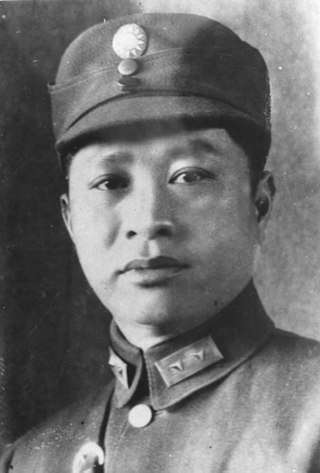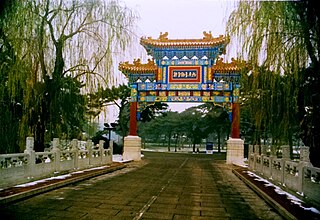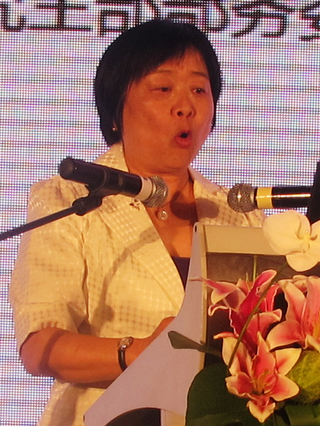
The Great Hall of the People is a state building situated to the west of Tiananmen Square in Beijing. It is used for legislative and ceremonial activities by the government of the People's Republic of China. The People's Great Hall functions as the meeting place for the full sessions of China's legislature, the National People's Congress, which occurs every year during March along with the national session of the Chinese People's Political Consultative Conference, a political advisory body. The Great Hall is also the meeting place of the National Congress of the Chinese Communist Party, which, since the 12th conference in 1982, has occurred once every five years, and the party's Central Committee which meets approximately once a year.

Ye Ting was a Chinese military officer and figure who played a key role in the Northern Expedition to reunify China after the 1911 Revolution. After serving with the Kuomintang, Ye later joined the Chinese Communist Party (CCP).

The Diaoyutai State Guesthouse (DSG) (simplified Chinese: 钓鱼台国宾馆; traditional Chinese: 釣魚臺國賓館; pinyin: Diàoyútái Guóbīnguǎn) is an ancient royal garden and modern state guesthouse-complex located on the east side of Yuyuantan Park in Haidian District, Beijing, China. Emperor Zhangzong of Jin once built a fishing platform here, thus the name "Diaoyutai", which has a history of more than 800 years. During the Qing Dynasty, the Qianlong Emperor ordered to dredge the Yuyuantan and build a palace here, which was then turned into a royal garden. The modern State Guesthouse Park was built by the government of the People's Republic of China in 1958–1959 on the basis of the ancient Diaoyutai Scenic Spot, as a place for visiting dignitaries to stay and for meetings and conferences. Diaoyutai State Guesthouse is located outside Fuchengmen in western Beijing, east of Yuyuantan, southwest of the intersection of Fucheng Road and Sanlihe Road.

The Treaty of Good-Neighborliness and Friendly Cooperation Between the People's Republic of China and the Russian Federation (FCT) is a twenty-year strategic treaty between China and Russia. The treaty was signed by Chinese President Jiang Zemin and Russian President Vladimir Putin on 16 July 2001, and it came into force on 28 February 2002.
Ren Jianxin was a Chinese high-ranking official, judge, and politician. He most notably served as president of the Supreme People's Court from 1988 to 1998, after having held the position of vice president since 1983, and as Secretary of the Chinese Communist Party's Central Political and Legal Affairs Commission from 1992 to 1998, overseeing all police, intelligence, and judicial agencies.

China–Kazakhstan relations refer to the relations between historical China and the Kazakhs up to the modern relations between the PRC and Kazakhstan. Ever since the establishment of diplomatic relations in 1992, political, cultural, and economic ties have developed between the two. The Chinese Communist Party and Kazakhstan's Amanat have good ties. China has said that it values exchanges between the two parties and hopes to strengthen ties and cooperation even further.
The Chinese People's Association for Friendship with Foreign Countries (CPAFFC) is one of the major foreign affairs organizations of the People's Republic of China. The organization is officially termed a "people's organization" and manages China's sister city relationships. Its stated aim is to promote friendship and mutual understanding between the Chinese people and foreign nations but observers have pointed out that it functions as a front organization in the united front system used to influence and co-opt elites to promote the interests of the Chinese Communist Party (CCP) while downplaying its association with the CCP.

China–Tunisia relations are foreign relations between China and Tunisia. The People's Republic of China (PRC) established diplomatic relationship with Tunisia on January 10, 1964, 8 years after Tunisia got its independence.

Chu Tu'nan, a native of Wenshan, Yunnan, was a Chinese male politician, who served as a vice-chairperson of the Standing Committee of the 6th National People's Congress and the chairman of the China Democratic League.

On 20–22 March 2023, Xi Jinping, general secretary of the Chinese Communist Party and Chinese president, visited Russia, in his first international meeting since his re-election as president during the 2023 National People's Congress.

Deng Xiaoping, the Chairman of the Central Military Commission from 1981 to 1989, as well as the paramount leader of the People's Republic of China from 1978 to 1989, died on 19 February 1997, at the age of 92, in Beijing. According to Xinhua News Agency, he died at 21:08 local time, from late stage Parkinson's disease complicated by pulmonary infection. Following a private funeral at 301 Hospital and cremation at Babaoshan Revolutionary Cemetery, a state funeral for Deng was held at the Great Hall of the People on 25 February 1997. It was the first major state funeral held in China since 1976 when Mao Zedong died.

From May 28 to June 1, 2024, Tunisian President Kais Saied paid a state visit to China at invitation of Chinese leader Xi Jinping, and attended the opening ceremony of the tenth Ministerial Meeting of the China-Arab States Cooperation Forum.
At the invitation of President Johannes Rau of the Federal Republic of Germany, Colonel Muammar Gaddafi, Leader of the Great Socialist People's Libyan Arab Jamahiriya, President Olusegun Obasanjo of the Federal Republic of Nigeria, President Ben Ali of the Republic of Tunisia, President Seyed Mohammad Khatami of the Islamic Republic of Iran, President Jiang Zemin paid a state visit to these five countries from April 8 to 22, 2002. During the visit, China signed several cooperation agreements with the three countries, encompassing diverse sectors such as trade and economy, culture, agriculture, science and technology, education, oil and gas, telecommunications, and transportation.

Lhasa No.1 Elementary School, formerly known as Lhasa Elementary School, is located in the Chengguan District, Lhasa, Tibet Autonomous Region, and is the first full-time public elementary school in Lhasa.
Shi Qirong, a native of Qu County, Sichuan Province, was a political figure and industrial manager in the People's Republic of China.

China International Engineering Consulting Corporation is a company run under the State-owned Assets Supervision and Administration Commission of the State Council. CIECC engages in engineering consulting, engineering design, engineering supervision, engineering bidding and engineering costing.
Xiang Chongyang was originally from Baoying, Jiangsu province, a member of the Chinese Communist Party, an agriculturalist, and served as the Vice Minister of Agriculture of the People's Republic of China. He is the son of Xiang Jutan.
Li Zhijian, native from Xi'an, Shaanxi Province, is a political leader of the People's Republic of China. He served as the party secretary and deputy director of the General Administration of Sport of China, as well as the president of the All-China Sports Federation.

Wu Xiaoling is a native of Weiyuan, Sichuan Province, and a former graduate of the Graduate School of the People's Bank of China. She has held a long tenure at the People's Bank of China and is the inaugural female director of the State Administration of Foreign Exchange.
Gao Yi, formerly known as Gao Bingjin, a native of Yishui, Shandong Province, was a political figure in the People's Republic of China, who served as Vice Minister of Education, and a member of the Sixth and Seventh National Committee of the Chinese People's Political Consultative Conference.













